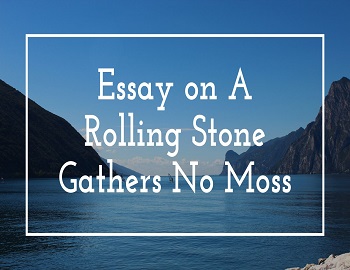A Rolling Stone Gathers No Moss:
Thomson Tusser, an agricultural writer and poet of the 16th century, wrote a book entitled Hundred Good Points of Husbandry in 1557. Many of the proverbs that we know today are traceable to this work which is a collection of instructions on farming, gardening, and housekeeping together with humorous and wise maxims on conduct in general. Says Tusser,
| The Stone that is rolling can gather no moss, For masters and servants, oft-changing is loss. |
The rolling stone “in this proverb” is obviously the man who is always changing his occupation and pursuits. The man who never settles down steadily to devote his time to the work in hand gains nothing. It tells us that if we constantly move about from one place to another and do not settle down we are not likely to succeed. Only those stones that have long remained in one place become covered with moss. In like manner men who go on working steadily in the same town or country, are most likely to become prosperous and successful.
As will be seen, most proverbs are generally half-truths, for there are always two sides to a medal. A particular proverb reflects strikingly only one side or the other. But since it is brief and pointed, it is often mistaken for the whole truth. Wisdom demands that most proverbs, like this one, should be taken with a grain of salt.
The proverb that we are discussing is good as far as it goes. It pointedly draws our attention to the dangers that lie in frequently changing our occupation. Only, those stones that have long remained in one place get coated with moss. In like manner, prosperity and fame come to those only who show perseverance and steadfastness in the pursuit of their aim. However, versatile and intelligent a person may be, he cannot master an art or trade easily. To acquire a high degree of proficiency in it, he must submit himself to a long period of apprenticeship with patience.
A few illustrations should convince us of the truth of this statement. A good soldier is not made in a day. Years of steady training and actual experience of fitting turn him into a good soldier.
A long application and continuous hard work at one job are essential if one wants to produce good results. Men, with fickle, wavering minds, are the “rolling stones”. They never stick to any situation in their trade or profession for long. Such men seem to have restless natures and are incapable of settling down anywhere to produce any positive results. What industry can do if one sticks to one’s settled aim is well illustrated by the steadfast effort of Demosthenes, the greatest orator of ancient times among the Greeks?
Demosthenes was greatly impressed by the honors which he saw paid to another great orator of the times. He was much more impressed by the supreme power of his eloquence over the minds of his listeners. Not being able to resist the charm, he gave himself up to it rather heart and soul. He renounced all other studies and pleasures. He studied the other orator’s method carefully. He made all the improvements he could from his precepts. The first essay of his eloquence was against his guardians whom he obliged to refund a part of his fortune. Encouraged by this success, he ventured to speak before the people, but a signal failure was the result. He had a weak voice, a thick way of speaking, and a very short breath. But his sentences were so long that he was obliged to stop in the midst of them to take a breath. This occasioned his being hissed by the whole audience.
Now, Demosthenes was a man with a firm determination. He was not a “rolling stone”. He would not give up. As he withdrew, hanging down his head and in the utmost confusion, an actor-friend of his met him. Having learned from him the cause of his being so much dejected, the friend assured him that the evil was not without remedy. The actor-friend told him to repeat some of the verses of the Greek poets. This Demosthenes accordingly did. The actor spoke them after him and gave them such graces, by the tone, gesture, and spirit with which he pronounced them, that Demosthenes found them quite different from what they were in his own manner of speaking. He now perceived plainly what was wanted of him. He applied his heart and soul to the task.
Demosthenes, efforts to correct his natural defects seem almost incredible. But at any rate, they prove that industriousness and perseverance can surmount all things. His speech was so defective that he could not pronounce certain letters. He was so short-breathed that he could not utter a whole sentence without stopping. He overcame these difficulties at length by putting small pebbles into his mouth, and pronouncing several verses in this manner without interruption, and by walking and going up and down steep and difficult places. As a result, no letter made him hesitate. His breath held out through the longest sentences. He went also to the seaside. While the waves were in the most violent agitation, he pronounced harangues, to accustom himself, by the confused noise of the waters, to the roar of the people and the tumultuous cries of public assemblies.
Demosthenes took no less care of his action than of his voice. He had a large-looking glass in his house. This served to teach him gestures. He used to declaim at these gestures before he spoke in public. To correct a fault which he had acquired by an ill-habit of shrugging his shoulders, he practiced standing upright in a kind of very narrow pulpit, over which hung a spear in such a manner that if in his excitement, that motion escaped him, the point of the weapon might serve at once to admonish and correct him. His application to study was no less surprising, To be more removed from the noise, he caused a small room to be made for him underground. In this room, he shut himself up sometimes for whole months shaving half his head and face, so that he might not be in a condition to go abroad. It was there that by the light of a small lamp, he composed his admirable orations. He rose very early in the morning and used to say that he was sorry when any workman was at the business before him. We may further judge his extraordinary efforts to acquire excellence from the pains he took in copying out the works of the greatest Greek historian no fewer than eight times with his own hand to render the style of that great man familiar to him.
A stone that is moved about cannot gather moss. The gathering of moss takes time. The “rolling stone” means a fickle, changeable person. A man who never settles down to anything for long is a “rolling stone”. The point is that if a person does not stick to one job, one profession, one trade, he will never gain anything. To realize one’s aim in life, one must stick to it firmly. To become a scholar, one must specialize in one subject. It is no use to jump from one subject to another. If you do so, you may be “a jack of all trades but master of none”. He who hunts two hares loses both.
But there is another side to the picture we are drawing. Man, to repeat the phrase, may gather moss by steadfast application to one idea or target, he must take care not to vegetate. Specialization and experience have their own importance in life. They, unfortunately, impose great limitations on his personality. The world is a rich storehouse of new experiences, adventures, and explorations. It is tragic to confine oneself slavishly to a small part of it. It is, a highly dull job for a person to work as a grocer, a clerk, a mechanic, or a soldier all time. Doing one thing for too long produces monotony. Churchill, the British statesman, was not merely a leader of his country but also a first-rate author and painter.
Finally, we may admit that there is something to be said for these rolling stones. Adventurers, explorers, travelers, and discoverers are generally people of restless disposition. Such people can never settle down to any one job. The truth of the matter is that it is to such “rolling stones” that the world owes so much. They can never sit still. Even if they gather no moss for themselves, they certainly gather a good deal for the rest of the world.









Comments (No)